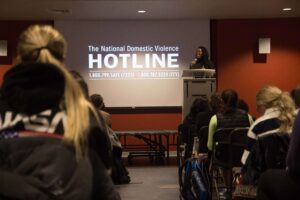by The Cowl Editor on April 19, 2018
Campus
by Kendall Cairoli ’20
News Staff

April is Sexual Assault Awareness month and Providence College continues to participate in the international movement to bring awareness, education, and prevention to college campuses. However, for both PC administrators and student leaders, addressing the topic of sexual violence is a conversation that they believe deserves recognition and engagement beyond the month of April. “It would be naive to think that our work would be done in a month,” said Kristine Goodwin, vice president of student affairs. “This is not a one month endeavor, but rather a 12 month endeavor.”
In order to continue a transparent and educated discussion regarding sexual violence, both Goodwin and Title IX Coordinator, Dr. Jim Campbell, have diligently worked to develop programs that address the issues on the PC campus. Offering students resources and education about sexual violence not only brings awareness, but enhances solidarity and support for victims.
Programs like Haven—an online pre-orientation program that is required for freshmen to take before they attend school in September—are paired with two top rated sexual assault prevention programs during orientation week, like the Bystander Step Up Program. These programs aim to educate students early on in their college careers, in the hopes of preventing sexual violence throughout their time at PC. They also equip them with skills that will help themselves or others when confronted with the issue.
“At Providence College there is a large investment in bringing awareness of sexual violence. When students have a trust and confidence in their system, they feel safe and more comfortable reporting their incidents of assault—that is vital to us,” said Campbell.
To establish a safe space for students to report their experiences of sexual assault, PC has partnered with the local police department as well as external Title IX investigators, who help administer updated resources and tools that PC can implement into their own human resources. To gather student experiences and opinions, campus climate surveys are sent to students, which ask questions about student’s experiences with sexual violence and harassment issues, along with a plethora of issues like gender and race issues.
From this survey, the administration is given student responses which help them tackle the issue of sexual violence in a more productive manner. Goodwin said, “When students fill out these surveys, we are able to triangulate all this data and grasp an idea of what is occurring on our campus and from there, we can gage the areas that we need to improve on.”
Student voices are vital in combating the issue of sexual violence, which is why these surveys are a vital aspect in the progression towards a safer community that grants survivors and victims with the resources they need.
For Women Will, a PC organization that focuses on educating the community on issues of gender and sexuality, the month of April offers an opportunity to heighten awareness of the issue and the preventive steps that need to taken in the future. One of the main events on campus was Take Back the Night, an event hosted on April 10 that created a safe space for students to share their experiences in a place of solidarity.
Ingrid Brugnoli-Ensin ’18 is the president of Women Will and believes that hosting lectures and community wide events works towards expanding peoples’ understanding of sexual violence. “There is a whole sexual assault spectrum, there are different experiences and different traumas endured, but every trauma is significant,” said Brugnoli-Ensin. Take Back the Night and other events ensure that there are platforms on campus for individuals to feel safe in voicing their experiences, while simultaneously educating others in the community on sexual violence and its effects.
By expanding people’s interpretations of sexual violence, people can learn what is okay and what is not, what classifies a healthy relationship, and when to notice when yourself or a friend is in an unsafe situation. With the countless resources that PC provides students, an underlining issue is still present, Brugnoli-Ensin explaineds, “There is a stigma regarding sex and sex education programs at a Catholic school, we can not really talk about the issue at hand without talking about sex, which gets messy and complicated.” As a Catholic institution, the topic of sex is complex. Brugnoli-Ensin went on to explain that difficulty arises in the inability to approach subjects like the practice of safe and consensual sex, because pre-marital sex in general goes against Catholic beliefs.
When safe and healthy sex is not discussed or taught, but turned into a taboo subject, students can be misinformed about responsible and safe sex practices, which may result in a hesitation to report or come forward with their experiences of sexual violence.
Despite these broader issues, we can all do our part as individuals to ensure the safety of ourselves and others on campus. Being an active bystander in social situations can be as simple as walking someone back to campus on a Friday night. There may be no grand solution to this problem, but a month dedicated to sexual violence awareness may indicate how much more work and prevention needs to be done and the small acts we can take to move towards some progress.
As this month represents many things, Goodwin reinforces the idea that it marks a moment for us all to reflect on our role as community members, saying “This month is an opportunity for someone to be a better ally, to be a be a support system, we all need to ask ourselves, ‘Am I doing everything I can, for myself or someone that needs me?’”